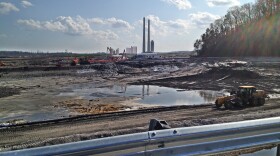The CEO of Duke Energy sent a letter this week to Governor Pat McCrory and the Department of Environment and Natural Resources (DENR) outlining the company's plans for coal ash clean-up in the state.
Duke says the letter is a big deal.
DENR described it as inadequate.
As you may know, it has been 40 days since a metal stormwater pipe running under a coal ash pit near the Virginia border ruptured. As much as 39,000 tons of potentially toxic ash poured from the Duke Energy site into the Dan River. It became the third largest spill of its kind in U.S. history before that pipe was plugged.
Since then, a federal criminal investigation has been launched into the relationship between Duke and DENR; environmentalists have made repeated calls to remove coal ash from 14 Duke-owned locations around the state - that they say are contaminating groundwater; and the governor, a former employee of the utility, joined DENR in calling on the company CEO to lay out short-term and long-term plans for coal ash removal.
"We had asked for information about estimated costs of clean-up, plans for the future a detailed timeline of what they were going to do," said Michelle Walker, with DENR.
The state got its response from Duke CEO Lynn Good in a letter received Thursday.
'So we were expecting quite a lot of information. And we received this four-page letter in response. And the secretary felt that that was simply an inadequate response and that we just did not get our questions answered.' - Michelle Walker
"So we were expecting quite a lot of information. And we received this four-page letter in response. And the secretary felt that that was simply an inadequate response and that we just did not get our questions answered," she added. "The secretary" is John Skvarla - a McCrory appointee and head of DENR.
Walker said the letter lacks details and that DENR was expecting 'reams of documents'. Instead the state received a four-page letter.
- The letter states Duke plans to remove all coal ash from the retired power plant in Eden, where the Dan River spill occurred within two and a half years.
- The letter also says Duke plans to remove all coal ash within four and a half years from a plant along the Catawba River, near Charlotte. (The company has 33 coal ash ponds in total.)
- The letter says that implementing short and long-term plans depend on state and federal agreements that the outlined plans are prudent, cost-effective and environmentally sound options. (The letter does not go into further detail about those issues.)
Duke response
A Duke spokeswoman declined a request for a recorded interview but answered questions, calling the company's plan to remove coal ash a big deal. She added more recommendations for clean-up are on the way, but did not provide a timeline.
'However there's no binding commitment that they will do it - in other words they could change their minds once the heat dies down.' - Frank Holleman
Environmentalist Frank Holleman calls this development a step toward a solution. "However there's no binding commitment that they will do it - in other words they could change their minds once the heat dies down. So we need a binding court order and a binding agreement," said Frank Holleman, senior attorney at the Southern Environmental Law Center.
Holleman says the Governor or the head of DENR has the authority to seek a court order mandating the company remove the coal ash - which is causing contaminants that violate state regulations and the federal Clean Water Act. He says much more thorough plans for all 14 locations are the next necessary step.
Meanwhile a different letter from Duke, dated Thursday, shows the utility is looking into lined coal ash storage at Charlotte International Airport.
Officials with DENR say they are again asking Duke for a more detailed clean-up plan, but have not given the company a timeline.
Legislation?
Also on Thursday, Democrats announced legislation they plan to introduce requiring clean-up. Politicians from both parties have called on the removal of coal ash and say they do not want to see the taxpayers or the ratepayers foot a bill that could approach 90 million dollars.
Finally on Thursday, A series of emails between Duke and DENR, obtained by the Southern Environmental Law Center, were released. The SELC says they reiterate a cozy relationship between both sides. DENR says the emails addressing proposed lawsuit settlements are being taken grossly out of context.











